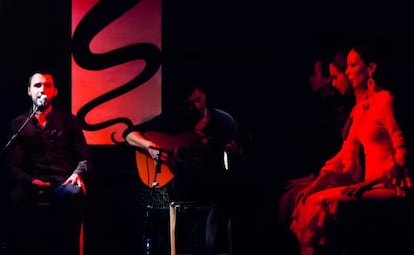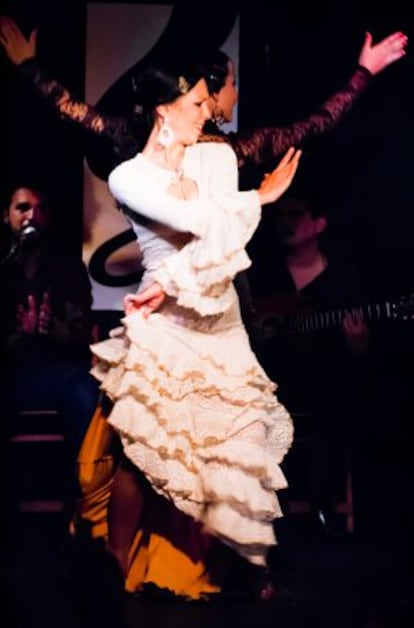A clandestine night of flamenco
Each Sunday the back room of a Madrid bar becomes the stage for an intimate dance show

A Sunday-night stroll down Calle Lavapiés reveals why the neighborhood of the same name is considered one of the most cosmopolitan and multicultural in Madrid. Waiters accost passers-by to drum up business at the many Indian restaurants; Bangladeshi shopkeepers sell anything from halal meat to red-hot Caribbean peppers; and sub-Saharan migrants whisper offers of hashish for sale to anyone who looks like they might fancy a smoke. But there’s still room for a slice of Spanish culture in this melting pot – you just have to know where to look for it.
For just over a decade now, on Sunday nights the back room of El Juglar bar is transformed into a tablao – or to put it another way, a temple of flamenco. At around 9pm each week, a silence descends on the intimate, atmospheric space, as three flamenco dancers – or bailaroas – take to the stage, accompanied by a singer and guitar player.
Flamenco has become more sophisticated. It allows for much more expression”
One of those dancers is Susana Peña, a Venezuelan who has been living in Madrid for 11 years and organizes the weekly show, which used to serve as a proving ground for students from Madrid’s famous Amor de Dios flamenco school, located nearby in Antón Martín.
“It started as a platform for people to get a know-how of the tablao,” she explains. “You only learn it from dancing.” But now the dancers and musicians are experts, and the night is an attraction for locals and tourists alike.

“It’s traditional flamenco in a modern space,” she explains. “A lot of young people come to see us,” she adds. “Those who can’t pay €25 or €40 to go and see a show at another tablao.”
As such it’s a great place for the uninitiated to get a feel for flamenco, an art form that often fascinates outsiders but can leave many Spaniards cold – something that Susana has discovered when handing out flyers for her shows at the Rastro flea market in Madrid on Sunday mornings. “People tell me they’re not interested – because they are Spanish.”
So what is the attraction of flamenco? “It’s a very emotional art,” explains Susana. “It’s not planned – you can’t rehearse it.” As each performer takes their turn during the show, they are in fact improvising, the choreography working on the basis of an unspoken, unsignaled communication between dancer and musician.
Susana is also an Amor de Dios graduate, and continues to take courses there, as well as giving flamenco classes for beginners in local bars. Apart from El Juglar, she has also danced in classic Madrid flamenco venues such as Café Chinitas and Corral de la Morería.
Her day job is teaching English, but as she explains, “dancing is my main motivation.” She started learning flamenco in Venezuela, but decided to move to Spain to take her knowledge further. “The technical level here is much higher,” she explains. Her interest lies, she says, in disciplined technique – “Virtuosity does not move me” – and flamenco that mixes other styles, such as bolero, or classical Spanish dance. “Flamenco has become more sophisticated,” she adds. “It allows for much more expression.”
Flamenco is a very emotional art. It’s not planned – you can’t rehearse it”
And for her, Madrid is the only city in which to learn. “The scene is always moving here – there’s an excellent level of flamenco, and some fantastic musicians. In the south there’s more focus on the gracia,” she says, dropping in one of those flamenco words that defies translation into English (see also duende).
The intimate nature of the shows in El Juglar is reinforced by the fact that afterwards the performers mingle with the audience in the bar – something that allows for immediate feedback. “I always want to make sure we put on a good show,” Susana explains. “We want to use the space to grow, and to experiment. I want to make sure people leave happy.”
So the next time you are stuck for a plan on a Sunday night, El Juglar should top your list for an entertainment option. Grab a curry first though – this is multicultural Lavapiés, after all ...
Juglar X Flamenco. Sunday nights at 9pm at Sala Juglar, C/ de Lavapiés 37, Madrid. Click here for more information.
Tu suscripción se está usando en otro dispositivo
¿Quieres añadir otro usuario a tu suscripción?
Si continúas leyendo en este dispositivo, no se podrá leer en el otro.
FlechaTu suscripción se está usando en otro dispositivo y solo puedes acceder a EL PAÍS desde un dispositivo a la vez.
Si quieres compartir tu cuenta, cambia tu suscripción a la modalidad Premium, así podrás añadir otro usuario. Cada uno accederá con su propia cuenta de email, lo que os permitirá personalizar vuestra experiencia en EL PAÍS.
¿Tienes una suscripción de empresa? Accede aquí para contratar más cuentas.
En el caso de no saber quién está usando tu cuenta, te recomendamos cambiar tu contraseña aquí.
Si decides continuar compartiendo tu cuenta, este mensaje se mostrará en tu dispositivo y en el de la otra persona que está usando tu cuenta de forma indefinida, afectando a tu experiencia de lectura. Puedes consultar aquí los términos y condiciones de la suscripción digital.









































